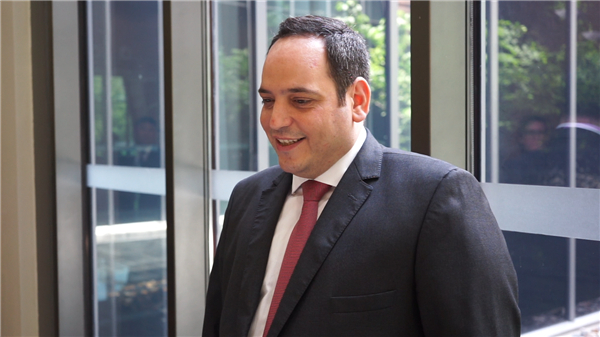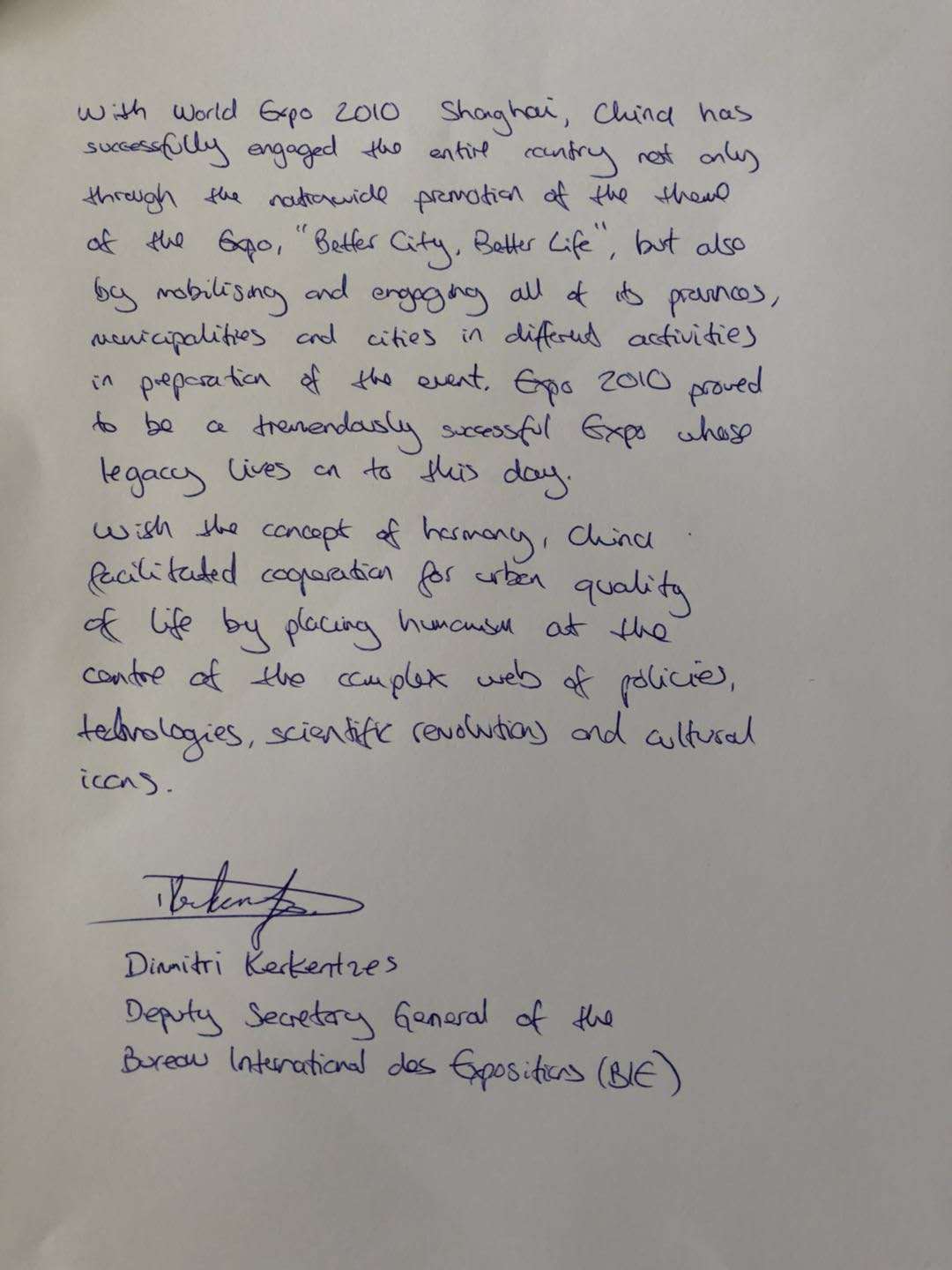World Expo Representative: How Expo 2010 has transformed Shanghai
In the Puxi area of the original site of the Expo 2010 Shanghai sits the World Expo Museum. Though eight years have passed since the opening of the Expo 2010, the word "Expo" never fades away in the city.
On May 11, a ceremony was held at the museum for the opening of the “Expo Heritage-Exhibits Collections from World Expos,” an event that gathered many Expo hosts and bidding countries, including Kazakhstan, Japan and Russia. The event also marked the release of BIE (Bureau International des Expositions) official publications of the Expo 2010 Shanghai and Expo 2015 Milan. BIE is an intergovernmental organization that has overseen and regulated World Expos since 1928. “This marks that the World Expo Museum has entered a brand new stage. We will witness it becoming a global cultural landmark and setting an exemplary benchmark for many Expos,” said Dimitri Kerkentzes, Deputy Secretary General of BIE.
Dimitri is an old friend of the Expo 2010. During the Expo, he spent seven months as a BIE representative to Shanghai. He is affectionately called Xiao Di by his Chinese friends here. Standing at the museum, the Expo eight years ago still remains strong in his mind.
(Dimitri Kerkentzes addresses the audience at the opening ceremony)
(A group photo of the attendees at the opening ceremony)

(Dimitri has an interview with Eastday.com)
Expo 2010, a grand opening of China to the world
China’s journey to be a World Expo host began over 150 years ago. As early as 1851, a Chinese man named Xu Rongcun appeared at the first World Expo in London to exhibit Chinese silk products. It was not until the 21st century, however, that China became the host country, thanks to its policy of reform and opening up and the rise of China’s overall national strength. In a sense, the Expo 2010 is a “witness” to the success of China’s opening to the outside world. It attracted people from all over the world like a powerful magnetic field.
“Expo 2010 was a grand opening of China to the world,” said Dimitri. “It brought 190 countries to be in Shanghai during the Expo. It means that people from all these countries were here present not just for six months, but for a year before to build their pavilions and for six months afterwards. That means for almost two years, Shanghai enjoyed a huge international community from all over the world, and used the Expo to show what China has to offer, not only inside China but also what they can offer to the world. I think this is the context that Expo 2010 has such a success: countries truly felt welcomed and a home in Shanghai and it showed by the success of the Expo.”
At the Expo Park, the massive China Pavilion, looking like an improbable assemblage of giant red timber beams or even chopsticks, presented to the world the charm of the oriental country. It showcased the process of urbanization in China during the first 30 years of reform and opening up, highlighting the scale and achievements of China’s urbanization. “I remember people queuing up from 6 o’clock in the morning waiting to get in and get tickets to see the China Pavilion,” said Dimitri while recalling the popularity of the pavilion. “It was very touching to see how much the Chinese people loved their own pavilion and how much they wanted to see it, and also to see from the foreign visitors the reactions of seeing the China Pavilion. They walked around it and appreciated Chinese culture and all that China has to offer.”
To Dimitri, Expo 2010 was different from any other world expos. First, it was the expo with the largest number of participating countries and visitors over its six months. It was also the expo with the largest number of visitors in one single day. So, in fact, Shanghai broke all the records when it hosted the Expo. Second, it was an expo in a developing country, and the Chinese were able to host and show what a welcoming country China is. It also showed what influence and what an impact China can have on the world and how China is willing to work together with all the countries in order to secure a safer future for humanity.
From May 1 to October 31, 2010, Dimitri attended the Expo 2010 in person, witnessing the strenuous work by thousands of Expo workers. “What I really admired in Shanghai was that nothing was ever perfect in the world, but every day in Shanghai, the organizer tried to do something to fix the little issue that they hadn’t found before. And this went on for the whole six months of the Expo. Every day the Expo tried to be better than it was yesterday. And this is something very impressive to notice, to notice that we don’t just accept these for how they are, but we keep on trying to improve them. In a sense, it is one of the key values of expos.”
From opening up to seeking cooperation
What the Expo 2010 has left for China and the world is not just wonderful memories. The spirit of the World Expo has also continued. Dimitri believes that no one can deny the success of the Expo 2010, not only because it has broken many records, but also what was left behind after the Expo. He summed up two very big legacies: one is the World Cities Day, a day approved by the UN for the sustainable development of cities, and the other is the World Expo Museum.
World Cities Day is an exact interpretation of the theme of the Expo 2010: Better City, Better Life. “This is what Shanghai Expo was about. It was about urban sustainable development. The Expo gave us six months to learn experiences from all over the world, not just from China, on how to evaluate this type of sustainable situations. And then, the government of China decided to take this on and had it approved in an international forum at the UN to make a day which is dedicated to this issue of how we can make cities more sustainable for all the citizens. So that was a crucial point and it showed the global impact of Expo 2010.”
While the reform and opening up has opened the door to the world for Shanghai, the World Expo has driven Shanghai from opening up to seeking cooperation. Shanghai made a successful transformation thanks to the Expo and it is sharing more development wisdom with the world. As a long-term cooperation between the Shanghai municipal government and BIE, the World Expo Museum (also known as WE Museum), serves as a repository of World Expo culture and innovation and a cultural exchange platform related to the World Expo while inheriting the core values of BIE: education, innovation and cooperation.
“The primary duty of any museum is to promote public education,” said Dimitri, who believes that the World Expo Museum needs to play a greater role in fulfilling its educational function. As he revealed, in the following months, BIE will work with the museum to turn the latter into an ultimate platform for education, not only in Shanghai and China, but also a large global education platform.
Since its founding, the museum has participated in the Expo 2012 Yeosu, Expo 2015 Milan and Expo 2017 Astana. It will also appear in Dubai at the Expo 2020. Speaking of his expectations for that, Dimitri said, “What I would like to see is that BIE together with the World Expo Museum will be involved in the forums that are being planned in Dubai with all the experts from the world in order to be able to take this information and all this intellect, bring it back here in Shanghai and push it forward for the next expos to discover.”
Thanks to the reform and opening up, Shanghai has changed a lot and, even since 2010, tremendous changes have continued to occur. However, “the feeling of the city remains the same. It is the same open city that I found in 2006, more than 10 years ago. It is still the same city where you can walk around freely and enjoy yourself. And there is something very special in Shanghai: a mix of cultures that have existed here, an international city and one that I very much enjoy coming back to as much as possible,” said Dimitri emotionally.

(Dimitri’s wishes for China’s further reform and opening up.)
